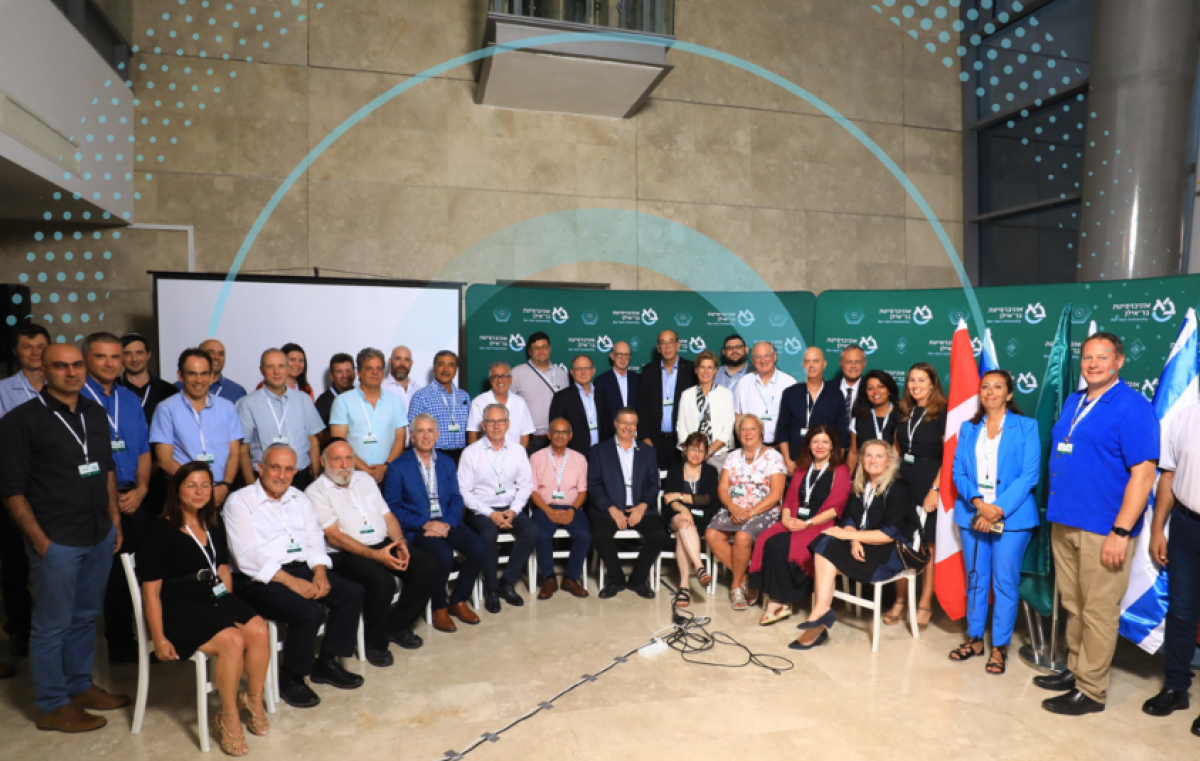Strengthening Israel-Canada Relations
University welcomes CIJA mission of Canadian university presidents; signs MOU

A new study published by Israel Prize-winning physicist Prof. Shlomo Havlin, of Bar-Ilan University, shows that researchers who work with collaborators across multiple research fields increase the chances of a paper being more highly cited, therefore making greater impact.
This conclusion also holds true at Bar-Ilan University, where the spirit of interdisciplinary research is paramount, University President Prof. Arie Zaban told a delegation of Canadian university presidents visiting Bar-Ilan this week. The group of more than two dozen, including representatives from Canadian Jewish Federations, participated in a mission to Israel led by the Centre for Israel and Jewish Affairs (CIJA).
"At the Institute of Nanotechnology and Advanced Materials, architecturally designed to foster interaction and exchange of ideas between researchers of different disciplines, we measured our output by checking how many papers are being published by researchers from more than one discipline and the numbers just went up and up," said Prof. Zaban. "We are also constantly asking ourselves if we are collaborating enough with the world outside of academia, because the big things happening now are happening because of mixtures of people, cultures, and disciplines. This is where we are investing our efforts and where we believe we can make an impact," he added.
Dylan Hanley, Chief Operations Officer at the U15, an organization that advocates for university research to the federal government in Canada, said that the delegation was visiting Israel to learn from the country's innovation ecosystem and to build, enrich and deepen research partnerships between Israeli and Canadian research universities.
With this goal in mind, the delegation was briefed by senior Bar-Ilan officials on a variety of impact-driven research projects and initiatives within and beyond the University's walls. Prof. Zaban noted that Bar-Ilan has been chosen to lead Israel's national genome bank "Mosaic" project, a database of genomic, clinical and community information that will identify genetics of new diseases and accelerate advancement in personalized medicine. Additional initiatives include Project “949”, a joint platform run by Bar-Ilan's entrepreneurship center UnBox Ventures with Sheba Medical Center and the Bezalel Academy of Art and Design to establish personalized medicine initiatives, and The Russell Berrie Galilee Diabetes SPHERE, created by Bar-Ilan's Azrieli Faculty of Medicine and The Russell Berrie Foundation to tackle diabetes and reduce healthcare disparities in the Galilee region of Israel and beyond. The Center for Energy and Sustainability, a network of more than 50 Bar-Ilan University research groups across multiple disciplines, industry, government, and startup companies that is collaborating on comprehensive solutions in the fields of energy, ecology, smart cities, smart mobility, security, the environment and more was also highlighted.
During the gathering Prof. Zaban and Prof. Graham Carr, President and Vice-Chancellor of Concordia University in Montreal, signed a Memorandum of Understanding (MOU) that lays the groundwork for the development of numerous initiatives over the next two years in collaborative research, faculty and student exchange, joint publications, and more. Concordia's Azrieli Institute of Israel Studies and Bar-Ilan's Martin (Szusz) Department of Land of Israel Studies and Archaeology are already exploring avenues of collaboration. The Bar-Ilan University International School and Concordia International will coordinate implementation.
"This gathering and signing of the agreement is part of leading cooperation of research and development between Israel and Canada. We continue to strengthen relations with Canada on many levels. Academic cooperation is at the forefront of our efforts since Israel is a powerhouse of innovation for good and there is huge potential for cooperation in many fields from nanotech to aggrotech to renewable energy and many others," said Israeli Ambassador to Canada Dr. Ronen Hoffman.
Prof. Zaban and Prof. Carr expressed their gratitude to CIJA and the Canadian foundations for enabling the visit to Israel. Prof. Carr added that "Concordia has a long history of collaboration with Israeli universities and is pleased to be entering into this agreement with Bar-Ilan. I hope it leads to great opportunities for our students and researchers to work together."
At the networking session following the presentations, additional Canadian university presidents expressed their interest in the fact that so much of Bar-Ilan’s outlook and focus on research aligned with their own and they look forward to exploring possible collaborations.